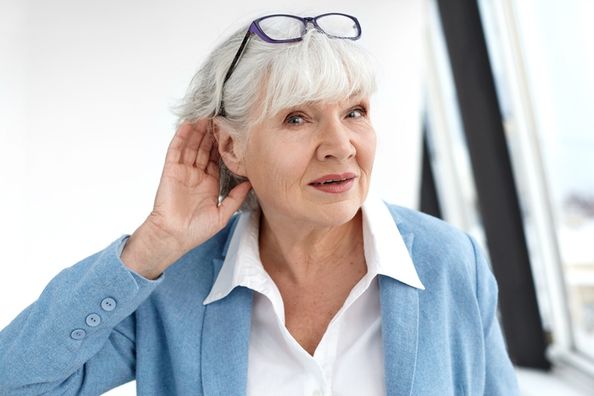Find that you’re suddenly having trouble hearing? Sudden Sensorineural Hearing Loss (SSHL), also known as sudden deafness, is rapid hearing loss that occurs all at once or over a period of three days.
A doctor can determine whether a person has experienced SSHL by conducting a normal hearing test. If a loss of at least 30 decibels in three connected frequencies is discovered, it is diagnosed as SSHL. A decibel is a measure of sound. A decibel level of 30 is half as loud as a normal conversation. A frequency is another way of measuring sound. Frequencies measure sound waves and help to determine what makes one sound different from another sound.
Hearing loss affects only one ear in 9 out of 10 people who experience SSHL. Many people notice it when they wake up in the morning. Others first notice it when they try to use the deafened ear, such as when they make a phone call. Still others notice a loud, alarming “pop” just before their hearing disappears. People with SSHL often experience dizziness or a ringing in their ears (tinnitus), or both.
Some patients recover completely without medical intervention, often within the first 3 days. This is called a spontaneous recovery. Others get better slowly over a one or two week period. Although a good to excellent recovery is likely, 15 percent of those with SSHL experience a hearing loss that gets worse over time.
Approximately 4,000 new cases of SSHL occur each year in the United States. It can affect anyone, but for unknown reasons it happens most often to people between the ages of 30 and 60.
Causes/Diagnosis
Though there are more than 100 possible causes of sudden deafness, it is rare for a specific cause to be precisely identified. Only 10 to 15 percent of patients with SSHL know what caused their loss. Normally, diagnosis is based on the patient’s medical history. Possible causes include the following:
- Infectious diseases.
- Trauma, such as a head injury.
- Abnormal tissue growth.
- Immunologic diseases such as Cogan’s syndrome.
- Toxic causes, such as snake bites.
- Ototoxic drugs (drugs that harm the ear).
- Circulatory problems.
- Neurologic causes such as multiple sclerosis.
- Relation to disorders such as Ménière’s disease.
Treatment
People who experience SSHL should see a physician immediately. Doctors believe that finding medical help fast increases the chances for recovery. Several treatments are used for SSHL, but researchers are not yet certain which is the best for any one cause. If a specific cause is identified, a doctor may prescribe antibiotics for the patient. Or, a doctor may advise a patient to stop taking any medicine that can irritate or damage the ear.
The most common therapy for SSHL, especially in cases with an unknown cause, is treatment with steroids. Steroids are used to treat many different disorders and usually work to reduce inflammation, decrease swelling, and help the body fight illness. Steroid treatment helps some SSHL patients who also have conditions that affect the immune system, which is the body’s defense against disease.
Another common method that may help some patients is a diet low in salt. Researchers believe that this method aids people with SSHL who also have Ménière’s disease, a hearing and balance disorder.
Health Topics:







